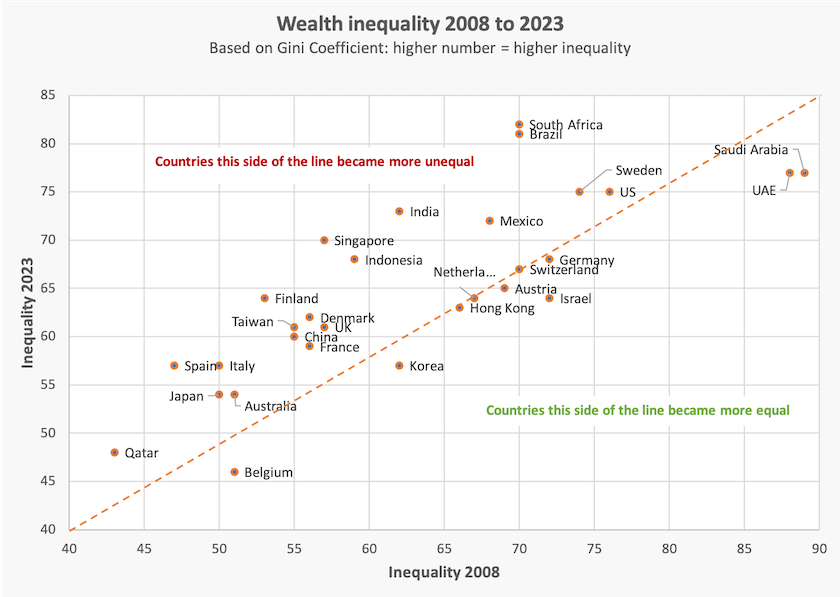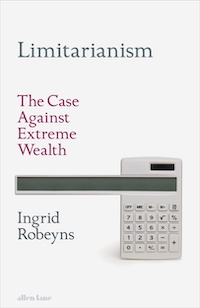Public ideas
Two threats to capitalism
Normally when we think of threats to capitalism we imagine streets of angry armed revolutionaries, amassing to attack the Winter Palace/The Melbourne Club. But the real threats to capitalism can come from entirely different directions.
Threat 1 – inequality
We learn from the UBS Global Wealth Report that there are 2664 people in the world with $US1.0 billion or more in wealth, including 14 with more than $US100 billion. Of these 2664 about 40 are Australians, but there are no Australians among the top 14, according to the Forbes Rich List. The renowned art critic Gina Rinehart tops the Australian list with a mere $A30 billion – about $US20 billion.
The same report finds that since 2010 wealth per capita has risen in most countries, particularly in Asia. This finding in itself, however, may not mean much, because it includes real estate, and because much of this growth has been fuelled by debt. That’s all rather precarious.
Over the same period the pattern of development in wealth inequality is mixed, but in general, wealth inequality has widened. The graph below, plotted from data in the Global Wealth Report, shows wealth inequality by country, and the movement in inequality between 2008 and 2023. Only a few countries, most notably Saudi Arabia and the UAE, became more equal, but they were starting from a base of high inequality. The US remained among the most unequal countries. Sweden always surprises on wealth inequality; in terms of income it is one of the most equal countries in Europe, but in terms of wealth it is easily the most unequal European country.
Australia started from a base of low inequality in 2008, but became more unequal. This low inequality score for Australia may simply reflect the reality that a large proportion of the population is sitting on over-priced land. Our financial wealth inequality is probably much higher than is indicated in this report.

As income and wealth inequality rise, so do calls for re-distribution, and they don’t always come from the traditional left. They come from moral philosophers, and from the very rich themselves.
Morris Pearl, former Managing Director of Black Rock, is Chair of Patriotic Millionaires, a group of high net worth people concerned about wealth inequality. Their concern goes beyond the morality of inequality. It is the hard-headed realization that in an economic system that is seen to be unfair, where rewards are unrelated to effort, and where what should be in the commonwealth is appropriated by the few, people will give up on the system. Revolutions, be they orchestrated by Bolsheviks or right-wing madmen, aren’t very good for economic conditions that contribute to prosperity.
On the ABC Future Tense there is a lively discussion with Morris Pearl and others: Limitarianism – could a cap on wealth reduce wealth inequality?. Limitarianism, as the name suggests, imposes a strict cap on the amount of wealth any individual can accumulate. That is advocated by Ingrid Robeyns, author of Limitarianism, the case against extreme wealth. Others on the panel are more in favour of traditional approaches, such as progressive taxes. In fact many of the extremely well-off pay a lower proportion of their income in taxes than those with modest incomes – an outcome arising in part from the way “income” is defined for taxation purposes. But practically those differences are small because both sides are aware that a system that allows the development of a plutocracy undermines the social legitimacy of capitalism.

In the same panel a completely contrary view, in line with the interests of those who believe there should be no constraint on wealth accumulation, is expressed by Robert Guest of The Economist, who puts the usual Economics 1 argument against high marginal tax rates. High taxes can kill the entrepreneurial spirit and can be self-defeating because in suppressing the revenue base they actually reduce the amount of money available to fund public goods.
Pearl and others are arguing from a different standpoint: if people revolt against an unfair system, all the basic economic assumptions fall by the wayside. The neat Economics 1 model would no longer hold.
Even the mainstream framework of economics acknowledges that extreme wealth has negative consequences, particularly monopolization, and the capacity of high wealth individuals to buy political power to secure economic rent. It’s surprising that Guest, Deputy Editor of a magazine that generally takes a considered editorial line on economics, in recognition of capitalism’s capacity to destroy itself, expresses the simplistic and discredited line once advocated by Ronald Reagan and Margaret Thatcher. We are now paying the price of their policies in the form of a backlash against their extremist economic policies, with the rise of populist “leaders” offering simple but flawed economic solutions, such Donald Trump, Nicolás Maduro, Javier Milei, Victoi Orbán and Peter Dutton.
The panel segues into a discussion about the possibility of rewilding the Internet – that is, taking it away from the hands of a few of the ultra-rich. This is a case where people with extreme wealth have been able to control not only the mode of communication, but also the content of that communication. Maria Farrell is author, with Robin Berjon of We need to rewild the Internet.
As well as the normal 30-minute podcast the Future Tense team also has a short post on the ABC website: The group of millionaires lobbying governments to be taxed more. It includes the view of ANU tax expert Cagri Kumru, who doesn’t favour limitarianism, but who puts forward the view that there can be different taxes applying to the very rich depending on the sources of their income, with one rate low enough to provide incentives for those who contribute to society, and a higher rate for idle investors living off rentier income.
Threat 2 – underconsumption
The other threat comes not from the very rich but from the satisfied – those who make do with what they have. They keep old cars running, they hang on to old clothes until they come back into fashion, they re-use plastic bags, they mend or re-purpose old appliances. The ABC’s Anna Chisholm has a short article onunderconsumption and how it’s being embraced in social media.
It’s a silent and serious threat to capitalism.
Has the West lost it?
That’s the rhetorical question posed by Singapore retired diplomat and public intellectual Kishore Mahbubani on the ABC’s Global Roaming last Saturday.
Ever since the end of the Cold War western liberal democracies have been behaving as if the whole world is converging towards their political and economic model, in the belief that that model lies at the end of some natural historical path, while they ignore the success of other models, particularly those operating in Asia.
Mahbubani points particularly at the failures in the USA, which is manifesting many of the same symptoms of social collapse as the Soviet Union experienced in its dying days, although it still has strong economic power. In this regard he specifically mentions an essay by Niall Ferguson We’re All Soviets Now – a strong story about social collapse (tainted by Ferguson’s denial of the importance of climate change).
As the world’s model of liberal democracy, the USA sets a poor example. In terms of the basics of human wellbeing it’s going backwards, while China and other east Asian countries have done an extraordinary job in lifting people out of poverty, a transformation of a scale never seen before in human history. People seeking to see their material position improve from a low base, when they compare their impressions of the USA and China, are unlikely to be convinced by the superior moral legitimacy of liberal democracy.
Mahbubani is a hard thinker, who grounds his arguments in hard data. He also refers to a less-easily quantified “spirit of vitality” as something the USA once had, and is now losing. That spirit of vitality is driving Asian countries, and it is something without which countries quietly sink into poverty,
He politely criticizes Australia for being too unaware of our own geography – although his criticism seems to be directed more at the Morrison government than at the present government.
Mahbubani tends to rely on broad classifications – the “West”, the “Global South” – while he ignores complexities and differentiations within these groupings. How has Japan become part of the “West”, and where does he put his own country, Singapore, a high-income country with an authoritarian government but with a strong rule of law?
Australians may rely on his tendency to generalize to argue that we’re in much better health than the USA, and that the USA presents a very flawed model of liberal democracy. But we certainly seem to have lost our “spirit of vitality”, a spirit that was thriving in the first years after Federation, and during the 15 years of strong growth after 1945. It had its brash, sexist and racist aspects, but there was also a sense of excitement and national confidence, akin to the energy Mahbubani describes and which we experience in Asian countries today.
That confidence has given way to a timid conservatism and a loss of self-confidence, manifest particularly in the ranks of Liberal and National Party politicians, and to a lesser degree among our Labor Party politicians. We found the idea of a first nations voice to be too hard to handle, we are ambivalent about pushing a path towards an industrial transformation to deal with climate change, we cling to the anachronism of a foreign head of state, and we readily yield our defence and foreign policy interests to the desires of historical allies. It’s a long time since we have had a Keating, a Whitlam, a Gorton or even a Menzies in our political ranks.
On history and democracy
Peter McPhee, of the University of Melbourne, writing in The Conversation, uses a book review to ask if history can guide us towards re-shaping democracy to ensure it can deal with today’s pressing problems – “the use of fossil fuels, the dangers of eugenics, threats to water supplies, social media and artificial intelligence, the need for regenerative economics, and the future of democracy, equality and tolerance.”
The book to which he refers is by Roman Krznaric History for tomorrow: inspiration from the past for the future of humanity.
McPhee disagrees with Krznaric’s view that “democracy is no longer fit for purpose”. McPhee’s contribution is a discussion of forms of democracy, including its representative and delegative forms, the level at which decisions should be made (subsidiarity) and the extent to which decision-makers are supported with information and evidence.
He offers some practical advice for those who are enthusiastic about re-shaping our democratic institutions without weakening democracy. Other futures are possible.